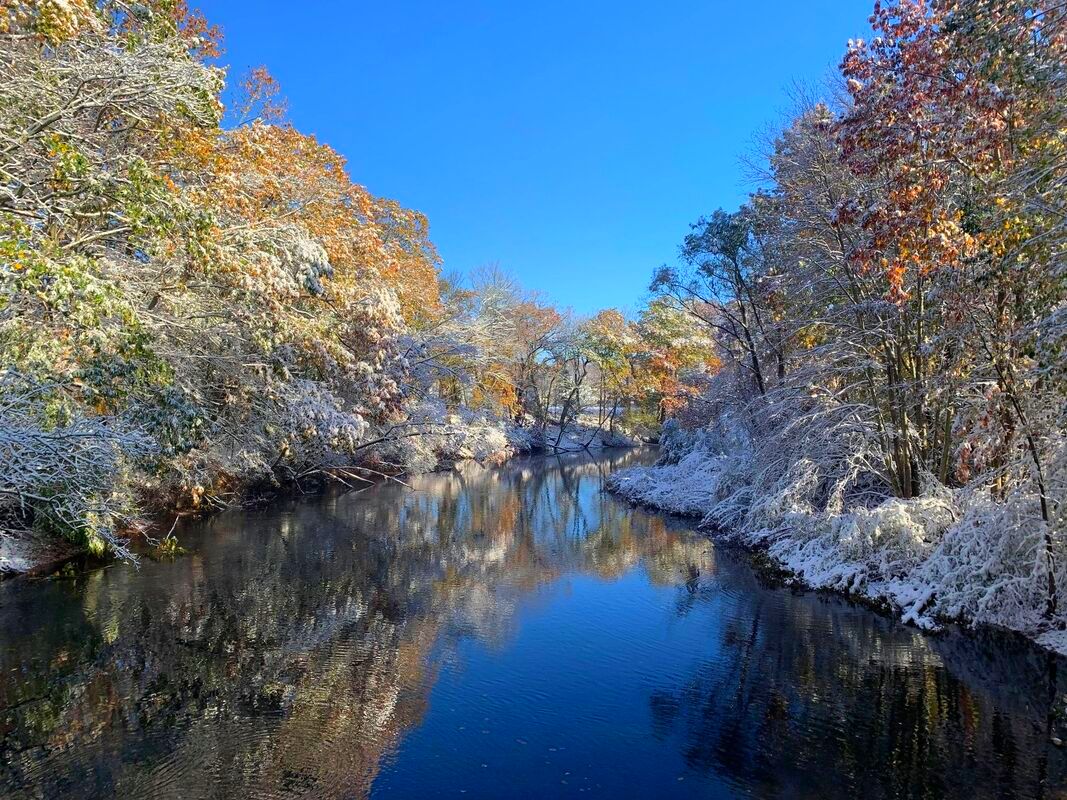 OK so...I have always been a religious person. Spirituality, theology, ethics, and philosophy were interests of mine since before I could remember. Honestly I think that as kids we are all intrigued by the question or our existence and purpose. Over time--and as we develop more accessible passions--those questions retreat to the backs of our minds and wake us up in the middle of the night occasionally. Am I living a just life? What is love? How do I act out of love? What will I do with this time before I die? These are hard questions to think about when we are trying to tag all the mundane bases of modern life. After all, asking these questions doesn't get us any more cash. If we take them seriously we sometimes get less! They also don't get the grocery list done or the house cleaned or the report filed. This means that most of us have little time to truly consider these questions and so being "spiritual" becomes associated with a vague warm feeling we experience on Christmas Eve or on top of a mountain. In those moments we are forced--in the face of awesome beauty--to at least acknowledge our connection to something greater. Then, holiday or vacation over, we return to the grind of the "real" world. Look, I love to hike. I love Christmas Eve! However, there is so much more to these questions and how we answer them. To think of our faith as something that exists in a discrete box--literal box in the case of a church building and metaphorical box in other cases--in our lives is to miss the point of the religious life. To live a life of faith is to consider these questions all the time. Then, through these questions, we touch the Transcendent. We experience the Divine and let it influence our next steps. Now clergy--like all people--go through rough spots in their faith and discipline. Our beliefs change and grow. We reject some ideas in favor of others and then sometimes return to the original belief. We also go on autopilot sometimes. The fact is, most of the work of a clergy person isn't terribly religious on the face of it. There are a lot of meetings and lots of planning for things. There are parties, classes, discussions and whatnot. Setting these events up isn't terribly theological. I have been through quite a few periods where I start to lose track of my faith and become basically like any other non-profit administrator. Then--usually--something will happen that reminds me that I am, in fact, a pastor. In those moments I recall that even the boring, mundane work of my day requires me to act out of big questions and their answers. I bring this up because when the pandemic started--along with some personal physical problems noted elsewhere in my blog--I was pretty sure that I would go into "survival mode" and that the journey of faith would take a back seat to everything that had to be done. There have been times where this was true. It is particularly difficult to stay faithful when there are thorny problems in need of resolution and a number of voices and differing opinions "speaking" at the same time. Occasionally I have struggled a bit while trying to seek consensus that hasn't really been there and trying to be rational for too long. However, in the end, I have found myself letting go and falling back into the answers those questions force upon me. I am learning to fall back on faith. It is weird to think of this as being something less-than-obvious in a congregation, but we all live in the practical "real" world. My faith community is filled with problem solvers who enjoy marshaling facts and applying them to sticky situations. Listening to hearts is harder. We are not rewarded for this behavior in our non-church lives. Our basic approach is to fight to get our way. We are surprised and frustrated when we don't. Right now though...things have changed. These days the path to survival and growth lies in thinking about others. It lies, in fact, in spirituality, ethics, theology, and philosophy. It is embedded in what we do in our religious lives. Social distancing--like social justice--is a practice of putting someone else's needs above our own both actually and symbolically. It means asking questions with no easy answer and putting our own egos aside for the sake of the group. This is a time where our faith needs to be strengthened. Which means it must be flexible. It must bend and not break. It means we must be intentional and conscious of all that is around us and move how the spirit directs. Anyway, I have had to make some tough decisions lately. Some of them are no doubt unpopular in certain quarters. Like everyone I know, I don't really have much of a clue what the future will hold for us. Yet I find joy in what I have discovered about my faith in this dark time. I was never sure it would withstand something like this. Instead it has grown. So a short celebration is in order, right? I hope that your faith is holding you up. If it is, congratulations! I congratulate you from my social distance. If it isn't then I am praying for you. All I can say is that I have been there and odds are I will be again. Keep up the good fight and let me know if you need anything. OK, essay over. I need to get back to work. There are more hard decisions today as there are most days. I will be thinking of you all. We will make it. We truly shall.
0 Comments
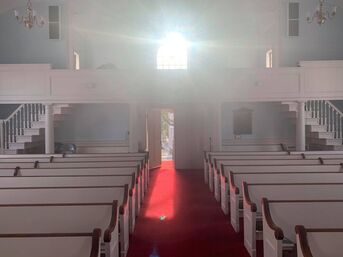 So we had our outdoor communion service yesterday. It was our third attempt at such an event and you know...I think we are getting the hang of it. I made it up to the church early--like I used to--in time to run through the brief words I was planning to say, It was All Saint's Day. The church, of course, was quiet. It always is at that hour. the fact that we still use parts of the sanctuary for storage reinforced the feeling a bit. Then the rest of the "crew" arrived. We set up with relative ease on the steps of the church. There was the communion table we always use, and the bread (for the first time individually wrapped communion wafers). Of course we also had the wine and the "wine". We always use the single-serving "little cups" for communion so--as long as we don't pass the plate and instead have folks step up to the table--they are naturally distanced. Everything was laid out on their respective trays the day before. They were maximally safe. the whole thing made for an odd combination of high and low church. Partly we were doing what we usually do. Partly we were a bit "off". However I would say we were comfortably off. Nothing felt alien. Finally, we decided on a "sound system". We had a microphone and a used practice amp that I bought a few years ago for $25. The goal was to reduce any yelling the officiants had to do. I yell when I am just chatting with someone. I yell even louder if I think people cannot hear me. Then people began to arrive. We waited the start time a bit so that folks having trouble getting settled could do so. Most people stood. We grabbed a chair for one person who has trouble standing. We grabbed a mask for one person who forgot theirs. Then we got rolling. The service may have been a bit casual for All Saints and it was definitely shorter--slightly under 25 minutes. However, it was the reason and the ritual for gathering. Truthfully we hung around for well over an hour in the end. It was good to see folks in 3D. This is the sort of thing I am willing to be a cheerleader for. As a church we are affiliated with the UUA and the UCC but really we are a community church and Congregationalist in its broadest definition. Worship isn't a discrete moment that happens in a specific place or at a specific time. It is what happens when we live our lives together as a community and a congregation. That is part of the tension, sometimes, when we think about how to respond to the pandemic. In another tradition--though I am actually having trouble thinking of any--perhaps there is a reason to elevate the "show" of worship over the communal needs of members. We are not a part of that tradition, though. We are part of one where we assess the needs of the people before putting folks at risk. the body and the spirit are connected after all. Yes, there are reasons why we might want to step--as a group--through those doors and into the sanctuary. There are issues of mental health, which I take very seriously. There are issues of church growth which I am not sure rise to the same level right now. I believe--and I know I have said it before--that God is Love. Sometimes we show our love for each other and for God by being together. Sometimes we show it by being apart. Sometimes we show it by standing on the church steps to take communion on a cold, snowy, November day. Part of our job--not just my job but all of our jobs--is to lead with that. We are opening our hearts during this dark time to the Divine and to our fellow, fragile, human beings. Back when I, my ministry, and Facebook were young, there used to be a big fight every year in the online "clergysphere" about whether it was ever appropriate to cancel worship during a snow storm. Many people--including many religious liberals who served churches that closed in July--insisted that church remain open saying, "God must be worshipped in God's sanctuary". What a tiny God that must be to live in our tiny buildings. I never found that argument to be terribly compelling.
God is not lonely. God doesn't need us to come visit. God is everywhere. Love is everywhere and we must adapt to what nature throws at us, knowing that the Divine presence is, in fact present wherever we may be in our storms and trials, Let us seek that Divine Love. We sure do need it now. Last night we had one of my favorite events. Every year on the night before Halloween the congregation and our neighbors surround our church with jack-o-lanterns and light them up during rush hour. We almost didn't do it this year--there was a snowstorm--and the general down-beat nature of the time was pushing against us. However, this is the holiday tradition that requires the fewest pandemic modifications. It is outdoors, after all, and we need to wear masks...on Halloween. Anyway, for the most part the event was great, but after a couple hours I was happy to get back home. I was frustrated--not by the jack-o-lanterns, or seeing my friends, or the excited cluster of kids--but from having to field complaints about why we are not having in-person, indoor, worship on Sunday mornings. As the pastor, I am part of the team that makes decisions around how to handle COVID and I am also the one who gets to hear from people who disagree. I get that but, man, it's not easy. Honestly, I do understand. I would rather be in church, too. I have built my whole life around what happens inside that building. The rest of the week when other people go about the rest of their lives...I am still there. The rituals of the church are a part of my identity. The church I serve and have served for over 17 years is part of my identity. I cannot stress this enough. I find it damned depressing to not be able to go in there and stand before the entire congregation to do what I do. But there is a problem. The plague doesn't care about any of that. When people complain about the church being closed I sometimes wonder if they know there is a pandemic on. Do they know how much the church leaders would like to be having church in person? In my heart I know they do. It isn't fair to them, but there yah go. We have also heard about the church that was open and everything worked out (so far) just peachy. Yet we also--because it is our job to research these things--know that that situation is unusual. The fact is, this disease can kill you. If it doesn't kill you, it can ruin your life. I think at this point we know enough folks who have had it. All those people who catch it but don't die? Many of them will be struggling with the results of this disease forever. It seems like quite a risk to take just to be in church. My theology doesn't sustain belief in a God that would demand that of human beings. God does not live in our sanctuaries. Another thing we forget is the fact that we are not as young and healthy as we think we are. I am a few months shy of 50 years old, myself and that does NOT make me immune. It is quite the opposite situation...and I am still considered young for my congregation. I see a few things at play here. First off, I am not sure most people respect nature nearly as much as they should. Here in the 'burbs we can go for a walk on the local rail trail and think we are in the wilderness. We are not. We think we can control nature and, therefore, the virus. We cannot do that either. I am tired of my northern relatives sending me articles of the increasing numbers of people being airlifted off the Presidents and Mount Katahdin. I am tired of the articles about the massive amount of litter left by my fellow suburbanites shedding weight when they realize that the mountain they are on is not like "hiking" at the local Audubon sanctuary. Given our inability to remember our masks when we leave the house (along with our unwillingness to turn around and go get them). I think I will be getting more of those articles. Second, we have learned so much about managing this virus. This is a good thing...but it is a double-edged sword. It feels to all of us like--given what we know--we should be able to do what we want. We have waited for a long, long time. It should be over by now. Problem is...it isn't over. In fact it is getting worse again. I know that I and others keep asking ourselves where the line is between a safe event and a spreader event. We, too, feel the "group-think" inclination to declare victory merely because we deserve victory. It is challenging to push back against that in our own lives. It is even harder to do so in community with people we love, who want to return, and who we want to keep safe. Just now I was talking to my wife, trying to figure out what we do for tomorrow's communion service. I am meeting with the Head Deacon later. There is snow on the ground. It will be cold. Is this the time that we head indoors? If so...how and why? As the weather gets worse I know that at some point we will need to format worship differently in order to be indoors (smaller groups, assigned seating, MASKS, et cetera). The problem is, each thing we know is true also opens up more questions. It is so tempting to ignore those questions and move straight to a certainty that oddly fits our convenience. I also think there has been a massive failure of leadership at the national and state level.. Everybody wants to be the cheerleader. We all want to say that we are "rounding the curve" or that--at the state level--the resurgence of numbers is just because of those darn kids and their parties. We are not rounding the curve and--sorry Governor--there doesn't seem to be enough evidence to blame the new numbers on the kids. The fact is, we don't know why we are still catching it other than that we aren't doing what we should in general be doing. Someone needs to make sure we don't backslide. However, big-time politicians like to be popular. We all do. Therefore the hard work of saying "no" has fallen to local leaders, local business people and, yes, local pastors. I have also, as a parent and citizen, had other people who are in a similar role say "no" to something I wanted to do. I know they don't want to say it. I also know that they have no choice. Sometimes, I have to remind myself that we are all in the same boat. Anyway, my most comfortable role in these situations is to be the cheerleader, too. I want there to be a coherent argument from the government about what is and is not safe, instead of personal theories that reinforce other people's personal theories. I want it so I can tell people that they are doing great and we will get through this! I want everyone to understand that we are facing great risks but that we have the spirit to persevere. However, since as a society we have decided everyone gets to do the cheering, I have to be among those who tell people to wear a mask. I am the one who gets to tell folks when and how we will worship indoors. I don't like it. But that is how it is. I am not a cheerleader today. There are a lot of smiley faces being slapped onto desperate situations. That optimism is generating a sense that we can negotiate with the plague and that if we want something very much we will get it. I am having to be honest with the church instead of super-perky. That is my job, too...as exhausting as it is. Pretending otherwise isn't going to help. You know what though? In my best moments I realize that God is on our side in this moment. As I said earlier, God does not live in the church, but among the people; inside us and between us. God is Love and love is where we must begin our response to life every single day. This is just as true as we move through this winter. In the end I am a pastor. All I can do is talk about faith and worship. Faith is something we possess that a loving church community can help us sustain. Worship is when we connect to the Divine, sometimes in transforming ways. Neither of these require a specific building or sanctuary. So what I do--what all my clergy colleagues do--is find ways for ourselves to worship and for others to worship as well. We are wandering in the wilderness. This isn't the wilderness at Baxter State Park but instead the wilderness of our society and our souls in transition. God is in this wilderness with us and while we would like to find Her in the old familiar ways, right now we must journey on and discover new--hopefully mostly temporary--ways to gain that connection. Here is a video that I sent to the church this morning. It is typical of the sorts of things I have to say in person, too. Be safe out there and be kind to each other. 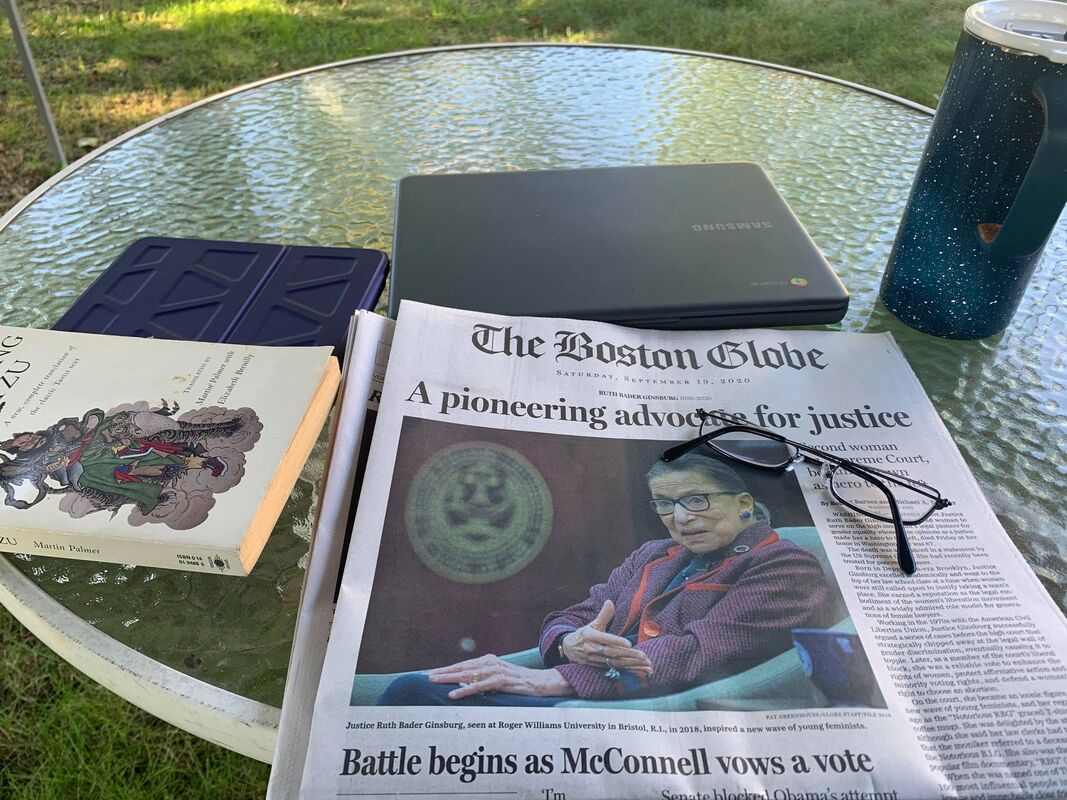 I woke up early this morning because my back was killing me. The final frontier of my recovery seems to be that every day I get about an hour less sleep than I need. It is quite the time for it. Every day is already surreal so a little sleep deprivation gives me an excuse for moments when I am at a loss for words or for when brief waves of anger, frustration or grief come over me. I am just a bit sleep deprived...yeah...that's it. Now I am outside beginning the process of sermon writing. I am not writing tomorrow's sermon of course. That was recorded on Thursday. Nope. Time has bent so much now that the weeks overlap. Each part of life has its own sort of week and each one of them appears to be nine or five days long. It is hard to do good work in this situation. We all know this no matter what "work" might be whether it is paid or unpaid activity...or just getting up in the morning. Next Sunday is our "Ingathering" service. We put it off a week to get ready as there are a number of moving parts, not the least of which is our "Water Gathering." That is when we bring water from a place that has been important to us over the past year and collect it in a bowl for the purpose of Baptisms, Child Dedications, and other blessings where water would be helpful. In some strictly Unitarian Universalist churches they call it "Water Communion". Since we are also a member congregation of the United Church of Christ we do not. We celebrate actual bread-and-wine communion the first Sunday of every month and water communion definitely isn't that. Anyway, it will be a bit crazy with "live" parts occurring beforehand to be taped for the actual Ingathering Sunday on the 27th. More time bending...No worries. But right now I am thinking about the theme for that Sunday. I am thinking about water, its powers, its flexibility, and its vastness. I am thinking about the rough currents of this time. "Fortune is a river," says Machiavelli, and many of us feel the uprooting force of fortune in flood. Frankly one would have to be pretty darn insulated to see and hear the news of the past few weeks and be able to deal with it on a purely intellectual level. The problem for the preacher these days is how to address the many current crises of our time while also connecting to the Divine. The challenges of this world drag us into the muck where we fight. That fighting is good and necessary! This is no time to be polite in the face of state-sanctioned violence, government neglect, and environmental catastrophe. There is no excuse to hide for long in the face of the bending of time. However, the power that we draw from to keep from getting consumed comes from our faith and we need a strong faith now. You see, I firmly believe that the blessing of a faith that challenges us is that it prepares us for the challenges we face. I also believe--given the world we live in--that our faith will not be able to sustain itself on its own. The spiritual path needs tending. Those of us who tend it regularly--at least our own if not the faith of others--are struggling. What about the people who got busy and haven't checked in with The Ultimate lately? What about the ones who are discovering that relying on cute quotes from Facebook memes isn't the way to keep keep one's eyes on the prize when the sky is on fire? Anyway, preachers, I see you this morning. Church leaders of all stripes, I see you too. I feel like I am not doing my best work in a time when my best work is necessary and I know that some of you feel that way as well, no matter why you couldn't sleep this morning. Here is the thing, though, we, at least, need to rely on that relationship we have cultivated in better times. Even now--especially now!--we must let go a bit of our own responsibility, our own reliance on competencies, and fall back into God. We need to pray (or meditate or study or whatever your particular discipline is) we need to pause. We need to understand that when we work at our best we are reaching into the hidden world to build a better world that is not concealed. If you take care of your hearts and souls, I will take care of mine, but we need to do this together and with others. Then we can reach out to care for this hurting world. It will require humility. It will require that we look beyond ourselves, not just to God but to other human beings and to nature. Self-reliance is killing us. So is the cult of individualism. Tomorrow's sermon (already recorded and in the can) is about our struggles with new rules; with trying to do the right thing in this world. I think on Ingathering Sunday I will lean into the vastness of Creation and the power of Divine Love once again. We need to remember its presence when there are forces in this world interested in stripping it from us. We need to manifest it, too, even though the reaction is...less than ideal. It takes faith. It takes courage. It takes hope for the world. Yesterday, while we were all discovering that Justice Ginsberg had died, my son and I were testing out the new "portable fire pit" at the parsonage to prepare for the Yard Theology session that will occur on our driveway later today. It is cold--52 Fahrenheit where I am sitting right now--but we need to see people. We need to talk. We need to remember our shared humanity during this time. Wherever and however you are today, I hope you find it. Let me know if I can help. We can do this. I do believe it. Today I pray That the new week will be better than the next That hope will come out of this darkness That we see our connection to each other To Creation To the Divine And I pray For the strength and wisdom To travel through the rough land To the better land beyond Dear Members and Friends, Worship and Religious Education are well underway this year. I have been enjoying getting to touch base with you all as we have gone about our usual opening rituals. I enjoyed getting to see folks at the Kickoff Sunday brunch. I was moved by the sharing at our the Gathering of the Waters during our ingathering. This congregation is a community that supports and hears each other. It is wonderful to be getting back together after our summer journeys. It was also great to see so many of you make an effort to get to church! This brings me to another topic that I would like to touch on briefly. I want to talk to you about attendance. Keep reading! You can do it! It may even be helpful to know that our current attendance is slightly higher this year... We have always been a church with a much larger membership than we see regularly on Sundays. This is fine. In fact, even though this is the case, most people do manage to drop in from time to time. People work hard to make it to non-worship events when they come up on the calendar. Which is to say that we attend Pub Theology, Dungeons & Dragons, philosophy discussions (like our Emerson group), Chili Cookoffs, house parties, vigils, rallies, and workdays, among other things. We are there for each other outside of church and for casual gathers, too. Eliot Church is blessed by a dedicated membership. It’s just that we can get really, really busy. The world isn’t constructed around “sacred time”. Many of our members work on Sundays. Others have rigorous travel schedules. There are illnesses, child commitments, weather challenges, and social obligations that get in the way of making it every week. I get it. There are weeks I don’t make it to church either. However, I would like to encourage all of us to make a point of attending worship when we can this year. In fact, I would like you to consider committing to making it to church more than you did last year! I will, too. I can think of an infinite number of reasons why we should make an effort. I bet you can think of a few as well. However, I would like to mention three key reasons for this church this year. Our Faith Community Needs Our Presence To Thrive: You may have noticed over the years that Eliot Church has gone through some changes. We are very much a community in transition. Our RE program is divided between teens and toddlers with no one in between. Our outreach and justice work (and, therefore our profile in the community) has increased substantially. We have also grown closer together as individuals. Heck, we even go skiing in New Hampshire together! The fact is, this church is doing a lot of work and having a lot of fun. We need your presence to make the party better. We need your participation to make the load lighter. We need your ideas to maintain this congregation and guarantee its future. Right now the church is strong. We want to keep it that way. This won’t just happen on it’s own. I am serious. There are no guarantees. If you value the Eliot Church, it isn’t enough to love it from afar. We need you to be here with us to keep it a living, loving, vibrant place. Worship is the biggest part of that. It is central to everything else we do. Our Faith Community Needs Our Presence for Others: Guess what? Loving Eliot Church from afar doesn’t help when we have visitors, either. Worship is usually where they encounter the congregation for the first time. The past couple of weeks we have had a few newbies drop by. If you are not here, they don’t know that you are part of what is happening. They only see those who showed up that day. Yeah, we do our best when people cannot make it. That said, when new folks come to church they are looking for others on the same spot in their life-path. It’s not that they don’t want to hang with everyone else. They just want to know that people like them are welcome and supported! That means they want to see parents of young children, new empty nesters, retirees, young couples and old couples and be greeted by those people. Life can be lonely. Visitors want to see folks who are interested in the same things they are interested in. In a small church--and being a small church is also our strength--the challenge is that when one or two individuals or families cannot make it on a Sunday, it is like that entire group just doesn’t exist. Once again, part of belonging is showing up. If visitors do not make some sort of connection with people they identify with after a couple of weeks? They find somewhere else to go to church. The congregation misses out on potential members. We members miss out on potential friends. Those visitors miss out on a community that they may have loved and would have loved them. We Need Our Faith Community: Look, getting through the week is hard. It is isolating. There are times when all we do is move from task to task. Even things we enjoy take time and effort. They leave us feeling tired and wiped out. Maybe there are moments when we just want to “sleep in” on Sunday. This certainly happens to me. However, when we step back and really consider it, that doesn’t make much sense. Let’s set aside the fact that services are at 10am. When we are home most of us can realistically both sleep in and get to church on time. I get up between 5 and 6 most mornings. I bet a lot of the rest of the congregation does too. We get the kids off to school and then get to work by 8 or 9. The only “school” the kids have on Sunday is at church. Also, the commute to Eliot is usually pretty easy. It is near where we live. Traffic is light. What we are really suffering from is inertia. We forget that church has something to offer. We forget that it is only an hour long on the slowest day of the week. We are forgetting that we need to feed our spirits. We need the church but we worry too much about the demands of our everyday lives and neglect the sacred elements that give those lives meaning. This is what keeps us home. The fact is, what sustains us is exactly what the church is offering. Stressed out and tired? Come sit with us and take a while to put those worries in perspective. Find some solace and new life in the rituals and ancient wisdom that worship provides. Do you feel isolated? Guess what! Your friends are at church. We can talk to you about your problems. We can listen to you talk. We can just have some coffee. We are not the first people to feel the way we do. That is why we are meant to join in community to explore the Divine. Coming together in worship helps us to live lives of greater meaning and strength. 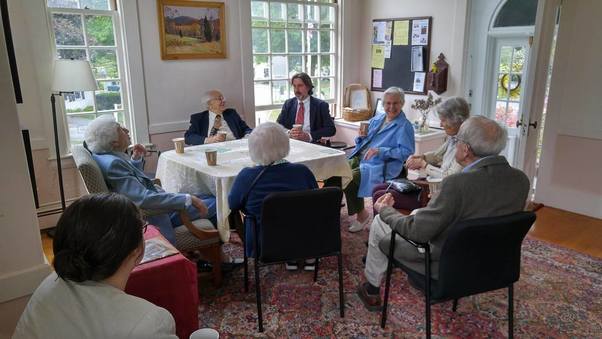 Final Note: As I mentioned at the beginning of this long screed, people are, in fact, coming to church. Also, those of you who were around a couple of weeks ago know that I made a big thing in the sermon about how worship attendance and participation is non-coercive in our tradition. That is true. Neither I nor the leadership is interested in making anyone do anything they don't want to do. That said, part of my job is to observe and encourage. Both your own spiritual well being and the future well-being of this community are in your hands. In this new church year, it is my hope that we continue to grow together as a healthy community of faith This Sunday we will gather in worship. We will have coffee hour. We will practice what we preach about being a caring spiritual community. I hope you can make it. If you cannot, then I hope to see you when you are able! See You in Church, Adam 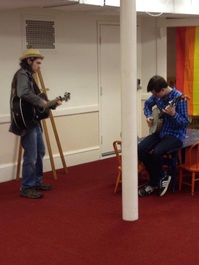 This Friday is the big Coffeehouse. We have two a year. This one--youth only--has always been the largest in terms of both participants and audience. There is an art show attached to it as well. The visual artists display their works and we keep them up for Reformation Sunday, which is also a big day in our church that includes worship, a "pageant" (about Olympia Brown), D&D, pumpkin carving, and the Jack-O-Lantern competition. Anyway, Friday is an important day for some of the kids and they work pretty hard to get the weekend going properly. It has always been interesting to watch the youth prepare. As young artists they are learning a variety of "languages" they can use to express their inner thoughts and feelings. It is a challenge for them. We all want to be understood. We also all know that our audience--our "public"-- will fall short of fully comprehending our message. Still, we try to get it right, don't we? To be fully human we have to try. A song--a painting, a poem, a photograph--comes from deep inside us. As artists our hopes are high. However, it helps to keep our expectations more realistic without also crushing that dream we wanted to share in the first place. I know how the kids feel. I have struggled to be understood in a variety of media over the years. However, the one I care about the most is preaching. I will never be a great (or even good) musician. My photography doesn't get much past the "pretty picture" phase. In pottery class I once made a 4-foot tall unbalanced black vase which may have been the ugliest thing ever offered up at a school art exhibit. I admit that I abandoned it. I walked away. For all I know it still sits there by the door to the North Yarmouth Academy teacher's lounge collecting cigarettes and dust. Preaching, though, I care about doing well. I feel it when I don't quite hit the mark. Yeah, preaching is an art. At least it is sometimes. It falls into the same category as chairs and benches. They can be built just to keep your bottom off the ground or they can be built to also elicit a feeling or a thought. I bet they--chairs--can even inspire action. I can go to the Museum of Fine Art to see (and sometimes sit on) a wide variety of items, or I can sit at my computer to get my emails done. One chair is not better than the other. They just have different purposes. One is a practical item that helps support our daily living. Our bodies and our backs are grateful for its presence. Another is all of that plus art. It makes us look up, out, down, or in. Even though we may be physically stationary we are, in fact, moved. Sermons should fall into that second category, even when people do not notice the "soul" within it. I have plenty of friends and acquaintances who work in professions where talking is part of the job. Politicians and lecturers (the good ones anyway) often use some of the techniques of preaching to improve their own work. Others believe there is no difference between a good lecture and a good sermon. Those folks are wrong, of course. You can give a fine presentation, but performing it in church doesn't necessarily mean you have come close to touching the sacred. After all, I can make a witty, informative, entertaining, motivational talk using the tools I am teaching those teens in my public speaking class. However, I still fail to preach sometimes. I have done it before (sadly) and I will do it again. The fact is, to create art one must dig deep. A good sermon--just like any of the offerings at our coffeehouses--requires a bit of personal exploration. It requires a moment of connection to the great "out there". In the moment of creation and interpretation we find that part of us and/or our world where normal conversation fails. Then we try once again to articulate it. As the Apostle Paul says in his letter to the Corinthians, "If I speak in the tongues of mortals and of angels and have not love, I am but a noisy gong or a clanging symbol." Finding that love (here used in its broad, theological sense) is the task of any artist--and we are all artists. The preacher tries to find some small glimmer of it each week to issue an invitation and offer up a path for people who hopefully feel drawn enough to walk another mile along the way. Preaching, like any art, requires discipline. We grow into our voices and into our "vision". Whenever you hear a sermon, you are listening to the product of hours, days, and years of prayer, meditation, and study focused into a tiny window of mere minutes. Sometimes it stinks. Sometimes it just isn't your bag. That said, have faith at least that the preacher is working hard. The colleagues I have met who didn't accept the preaching moment as a sacred one are all doing something else with their lives now. Leading worship isn't something you do without love. When I think of the kids getting ready for this weekend, I think of this process. I hope and pray that in their important and necessary playing around they find what they need to build a life of deep spiritual expression. I hope they find something that motivates them and makes all the steep lonely hours of practice and study worthwhile. The world of hard matter may never give them a measurable reward for their efforts, but maybe they will find that reward where they keep their souls and spirits. Maybe they will reach others through the foggy chaos of their existence.
Then--maybe--they will make us all a little less broken. So today is the first official day of my sabbatical. I have already been working on various projects but in the next week or so, things will be kicking into a higher gear. Over the last few weeks, there have been some changes to the plan. My "Folk Project" will need to take a back seat to some more pressing material. In fact, a theme has emerged that runs through most of the other projects and, naturally, this is something that I intend to follow.
I am enclosing here the outline of my work for the next few months. They are roughly in the order they will be addressed. Of course, there will be some overlap as well. Teaching: Some of you are aware that I have a son who is "homeschooled". The term--while it makes sense from a legal perspective--is a bit misleading. Most homeschoolers do NOT spend their days sitting around the kitchen table. They are highly social and are involved in programs outside the home on a daily basis. Many times they have a great deal of control over what and how they learn. It can be complicated, but for a certain kind of kid who is willing to take ownership of their education, a well-conducted homeschool plan is just the best darn thing. Among other activities, my son attends a school that subscribes to a "self directed learning" model. It has teachers and advisers who help the student plan out their year. Various courses are offered by the teachers, volunteers, and interns based on the interests of the student body. This is where I come in. I will be teaching two course at the school this fall. One is Public Speaking and the other is Nature and Spirituality. I know a bit about both subjects and expect to learn more. I am looking forward to this. I am curious how it will go. While I have done some teaching with children in this age group (10-19), it has been mostly in a church context. Of course, there is a great deal of similarity between a Sunday School model and what happens at this school, so it won't be entirely unfamiliar. Still, it is good practice and a lot more "face time" than what I am used to. Each class meets formally once a week and then I will be available as a "mentor" at other times. Thanks to this time commitment, it is the first on my list. Church Curriculum: I have written about this before. We are transitioning our Sunday School to a "one-room" model with a series of "units". Each unit will lead to some kind of project or presentation in church. I am responsible for writing all but one of these. My former intern (now sabbatical pastor) will be writing the second unit on Advent. I have already written the first unit, which is about women in the church. This means that the next one I am concerned with (a social justice unit with a focus on LGBTQIA+ issues) will need to be ready some time in November so the teachers and I can go over it before it's January start date. Obviously, the teaching I will do at the school will influence how I go about these curricula at church. In both cases there is a "project" element. Also, they both work on a student-centered discussion model. A great deal will depend on their willingness to be engaged and our ability to engage them. I am actually moving a little slower in this area right now because I think that my perspective may change after doing some teaching. Dungeons and Dragons Club: Yeah, there is this. I am well into the development of a world for my player characters to explore. I have been a Dungeon Master for many a year, starting way back in my teens when being a nerd wasn't so cool. Perhaps that is why I am still a bit surprised by the level of initial interest from the kids. It is a great thing! I am very pleased. My goal is to have enough material ready for a first meeting near the end of September. At that point we will make characters and perhaps run through a couple of short battles or scenarios to see if everyone gets the game mechanics. It would also be good to see who actually shows up so we can plan for either one or two groups. I will probably also need a rotating cast of "assistant DM's" to keep things rolling... OK... I assume you see the theme, right? All of these activities will apply most directly toward the church's religious education program. RE has been an interest of mine ever since my first paid gig as "Co-Youth Group Director" for the middle schoolers at the UU church in Evanston, Illinois. In my current capacity I don't have as much time to do get into it as much as I would like. I am hoping that using my sabbatical time to get the prep work done will make me a better pastor to the kids and their parents. We shall see... What this does mean is that the who Folk Project must be the last of my concerns. I haven't given up on it entirely. However, the spirit does seem to be moving me in a different direction right now... I want to be clear. I chose a life in the church. When I was about 17, I became one of those kids that hangs around the margins of friendly youth groups. I would show up for pizza and movies. Sometimes, I might even go to worship. At that time my parents were not church people. They liked to sleep in and have brunch on Sundays. I went on my own.
There were many reasons for my decision. I was interested in issues of life and death that didn't seem to be addressed in other places. I was also a very political kid. In fact, I decide to become a minister at the 1988 Democratic Convention in Atlanta. I was a "page" for the Maine delegation (I wasn't old enough to vote ). However, I was also there as a volunteer for Jesse Jackson's presidential campaign. It was my time with that campaign ---staying up late with a combination of labor organizers and pastors ---that helped me find a different path from the political system I had become disillusioned with. That is when it finally occurred to me that I could find a way to combine my interest in spirituality with my interest in helping people. None of those folks I knew in Atlanta would remember me today but I am glad that I met them. The point is, I love the church. There have been times and contexts where I have found myself in a "poor fit". There are times when I have grown tired both as a layperson and as a pastor. This is natural. That said, I have made the church central to my existence. It is my job. The church houses, clothes, and feeds me...literally. When everyone else leaves, I am still there. It is also, in many respects, central to my social life. Outside of my family, the vast bulk of my friends are either clergy or clergy spouses. So it is no small thing to me when I see the changes happening in our congregations and institutions. You can count me in the front ranks of those who have a lot to lose. Like everyone, I see that most churches are shrinking. Some of them are closing. Supporting institutions like denominations/associations and seminaries are merging and sometimes vanishing as resources for survival become harder to find. Well-meaning church growth consultants will sell you recovery programs. The problem is that their success rate is hardly better than doing whatever you are doing now. Pub Theology isn't going to save us. Tweaking the liturgy isn't going to save us. Increasing or decreasing staffing isn't going to save us. Altering our programming isn't going to save us. At least not the "us" that we think of when we think of the traditional institutional church. Change is already here. It is inevitable that we greet this desperate situation with a certain amount of anxiety. This is simply because the change we see is also inevitable. There are too many forces at play to turn back the clock and expect that being the "best congregation or denomination ever" is going to bring people back in to worship every week. We are in the midst of watching something we love potentially die. It is as if we built sand castles on the beach expecting that the tide would never rise. Well now it has risen and it will continue to. Building a bigger moat will work about as well as it does on the beach. Our culture will not reverse itself. The institutions that we know and love will either fall into the sea or become something entirely different. We do no one any favors by pretending that this isn't happening. When we do, we all end up running around trying to fix it. Then, when we fail we label ourselves "failures". Perhaps we find others (denominational leaders, pastors, church moderators for example) to blame for a flood that has been centuries in the making. In any case, we mourn the loss and see it as final and tragic. None of this is a necessary response. What we should do is stop our whining and face the future with our heads high and our hearts open. That, of course, requires us to greet our situation using a different frame. Instead of anxiety, fear, and frustration as we watch the "old thing" fall away we need to turn to the "new thing" being born with a combination of hope, love, and excitement. It is exciting, you know. After centuries of doing roughly the same thing we have been chosen to reinvent how people do religion! Who wouldn't want to do that? I don't know about you but I believe in resurrection. I feel blessed to be able to witness at least the beginning of this one. The challenge ahead of us, frankly, is a big one. Those consultants I mentioned? They are doing their best but the fact is no one knows what is coming. They are showing us programs that worked somewhere else (we hope). They do not know our (or your) church. Each congregation and each religious organization has a part to play in this resurrection story. That part requires courage. There will be more failures in our future than victories. Yet, the victories will be greater than our failures. It means every leader of every committee in our committee-filled faith will have to expect that they will be sifting through the ruins of plans A, B, and C (at least) to find the small successes with which to build a new way of doing church. Every pastor will have to expect that the church they are building may be beyond their (our) skill set to lead. Denominations and Associations may have to face the fact that they are in the way rather than the way. Everything must be on the table. Why would we expect what comes next to be at all like what is here now? As you might have gathered, I am not planning to make any great system recommendations at this time (and possibly ever). Too much is in flux. What I would like to suggest, though, is that we practice changing our attitude. We need to be aware of our irrational concerns and to work to solve only the rational ones. We need to once again find joy in innovation. We need to cheer the heck up and open the windows. Throw things against the wall and see what sticks. Then clear out what falls and move on with more grist for the mill.. This is not a time for timidity. Church mice can hide and wring their hands. The rest of us cannot afford to. I chose a life in the church. I do not want the new church to be built by people with closed minds and hearts. I do not want to spend the rest of my life in an institution that is bitter, angry, and always looking back. I do not want to live in a church that is sincere but scared of the world around it. Can we prepare ourselves for the leap of faith? I hope so. I do not enjoy living in a world of infinite resignation. Here as promised is the "Flashback" post from last year about long-term ministries. I mentioned it in yesterday's post. Enjoy!
One of my greatest weaknesses as a pastor is--quite simply--that I am not the most organized person to ever wear a Geneva gown. It is a problem that members of my church are rather familiar with. Over the 11-plus years we have been together we have learned to adapt and adjust. Like any long-term relationship, we have found ways to bring out the best in each other...most of the time. However, one of the problems that this creates is that I am suddenly feeling the need to learn more about long-term ministry. Being in such a ministry will do that to you. I have changed since I arrived in September of 2003. My congregation has changed. The landscape we now are moving through has also changed. We are doing just fine, thank you, but I feel that I need to reflect a bit to be on my game. The best way would be an ongoing group or a workshop. That is the problem. I am not good at planning. However, I am good at thinking so I thought I would share with you some of the topics that I think such a workshop or group would have to address if someone more gifted in this way were willing and able to work with me on such a thing. 1) Big Famous Keynote: Yes, we can have one of these. I am affiliated with both the UUA and the UCC. So is my church. It isn't hard to think of a few former pastors of big churches who fit into this category and who love to talk. However, what I am looking for from him or her is something very specific. I want theological and spiritual reinforcement for the value of long-term pastorates. This is important stuff and plays right to the strength of "Reverend Biggs". For applied and practical elements, I want to hear from other people who have experience in congregations that are a bit more typical. 2) How Do You Advance Your Career?: ...and what constitutes a successful career if you have stepped away from a system where bigger is always better? We know why Reverend Biggs stayed at the big steeple right? The pay was good. Important people had heard of the good reverend's church and wanted to invite the pastor onto committees and such. There was time off (thank you Associate Pastors!) to write that meditation manual. This is all fine. Rev. Biggs worked hard, spoke well, and got the brass ring young enough to also serve in one place for a while. Most of the long-term pastors I know, however, do not serve "big pulpits". We labor in relative anonymity. It is an easy thing to get noticed in that one big congregation in your association. What do the rest of us do to influence the direction of our various denominations? How do you get your voice heard when you have stepped off the career ladder for something you find more fulfilling? 3) How Do You Grow Spiritually Together?: Or, if you prefer, "How do you keep from getting bored or being boring"? A long-term pastorate, like any long-term relationship, can get dull if you don't work on it. My wife and I go to a lot of concerts, date nights, couples nights, and so on. We go for long walks to chat. We have been together for twice as long as I have been at the church. Now I am not one of those "ministry is like a marriage" people because, well, it isn't like a marriage at all. That said, it is still a relationship that needs work. What are the equivalents to these sorts of experiences in a long-term ministry? I will say that I have had two rather distinct ministries at Eliot. There was the one before my sabbatical and the one after it. Both were quality ministries but they were different. I wonder if some sabbatical planning would make a good workshop. 4) How Do You Grow On Your Own?: Again, the same people all the time. The same patterns. What do you do away from the church to keep yourself sharp? 5) What About New People?: Some long-term ministers are pretty good about integrating new people. Others not so much. We have leaders we are comfortable with. Often we have known them for what feels like FOREVER. What sort of tricks and techniques would help facilitate lay-leadership growth? 6) How Do You Not Mess It Up For the Next Person (and here I mean Parson)?: This. Is. Important. A Church isn't after all, about us. In a long-term ministry it is inevitable (particularly in small and mid-sized churches) that the pastor becomes part of the architecture in some sense. The church building...the old communion silver...the ancient pastor who baptized both you and your kids...all are permanent and timeless after a while. What happens to the new person when they show up? How hard have we made it for them if we have over a decade of service in one place? I would like to hear from a really good Interim and find out what drives them crazy about us. I even have someone in mind. 7) God: This is the most important question. Where is God in our ministries? Are we in the same place because we don't want to (or cannot) move? Is there still life and spirit in the pastoring? These are important questions. Certainly there are always practical considerations that make us choose to stay. At the same time we are ministers. If God says "go" we go. If God says "stay" we stay. Perhaps this is where we end with small group discussion inspired by Reverend Biggs' sermon. We cannot let our relationship with God get old. Anyway, this is my non-exhaustive list. Can anyone think of other items? My years at Eliot easily rest among the very best things that have ever happened to me. I know that every long-term minister would agree about their settlements. That is why we are still around. That is why we do the work we do. The challenge is to keep doing that work and to do it well... Lately I have been giving thought to my sabbatical. This is something most parish ministers receive every 5 to 7 years. This is my second at Eliot Church. If you were to ask me 10 years ago whether or not I was going to have even one sabbatical at Eliot, I would've claimed that the odds were long. I had just finished a very short productive – but – difficult first settlement. The idea of staying in one place for an extended time, while appealing, seemed highly unlikely to me. Yet, here I am in my 13th year at this congregation.
Last year when I was thinking about this topic I posted on the old Burbania Posts I talked about best practices for a long settlement. I will re-post that here sometime soon. However, an article has been floating around Facebook that addresses the same issue. The article (linked below) lists eight "steps" or maintaining a long ministry. Some of them feel a little obvious. The first one “never stop learning" reminds me too much of "don't stop believing" to be of much use. Besides, it's pretty obvious. However, there are others that are useful. Being willing to change, empowering others in the congregation to do their own ministries, and keeping a regular Sabbath are all good ideas and ones that I try to follow. My favorite, though is the concept of “reverse mentoring”. The author suggests that we practice the habit of learning from the young and innovative people in our lives. There are few things in my ministry that I love more than hanging out with the youth groupers. The opportunity for me to learn and grow is a big part of that. All of these specific suggestions point to a more general stance of flexibility. I remember at my long-ago "candidating week" (when finalists for a position and the congregation they hope to serve spend a week checking each other out) telling folks that an average ministry lasts for around 5 years. A long ministry, I believed then (and still believe now) is a series of 5-6 year ministries where the staff remains the same. Sabbatical (a form of Sabbath) obviously helps to keep minds open to what that new ministry might look like. Anyway, here's the article. I found it interesting and a worthwhile read for those who hope to have a long stay in whatever congregation they happen to serve. For those of us who have had long ministries it is useful to find a language to explain what it is that we have done. Again, tomorrow I will add a "Flashback" to this page with the article I posted last year. |
Adam Tierney-EliotThis is my old weblog of many years. I will probably post here from time to time is there is a subject that does not fit WWG. However WWG is the more active page at this point. Archives
April 2022
Categories
All
|
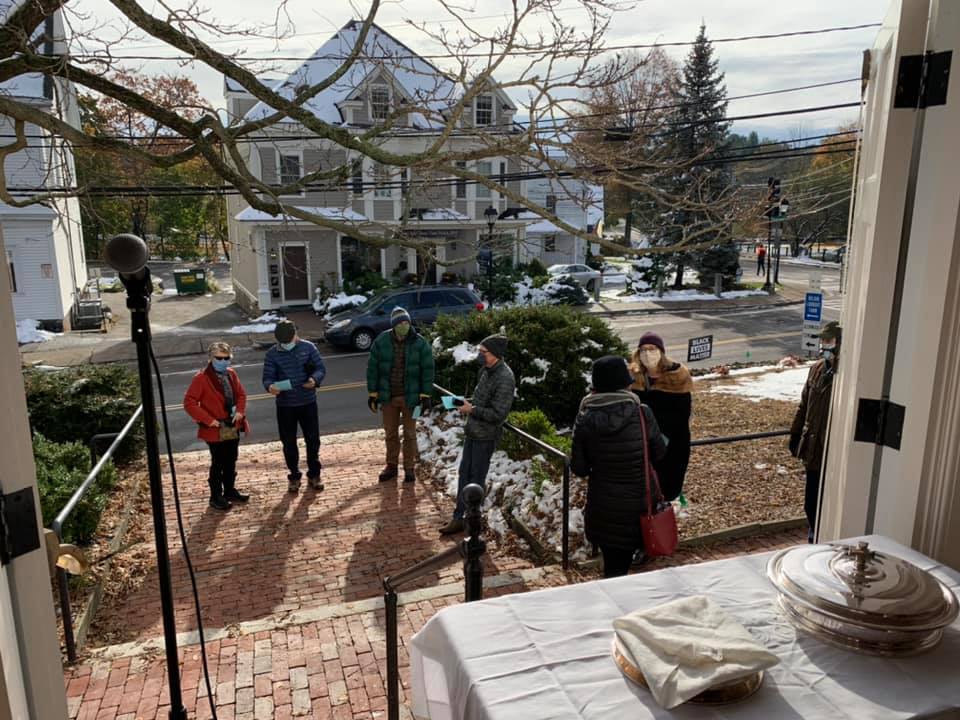
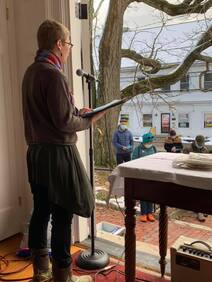
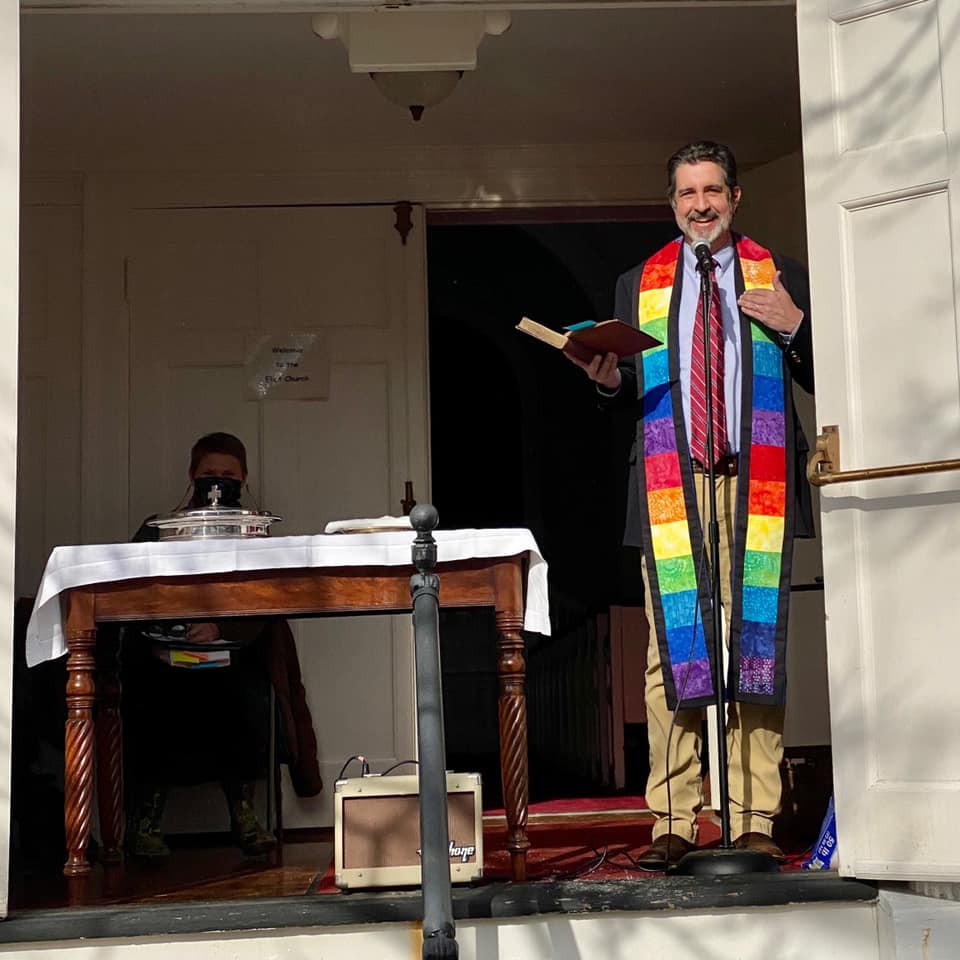
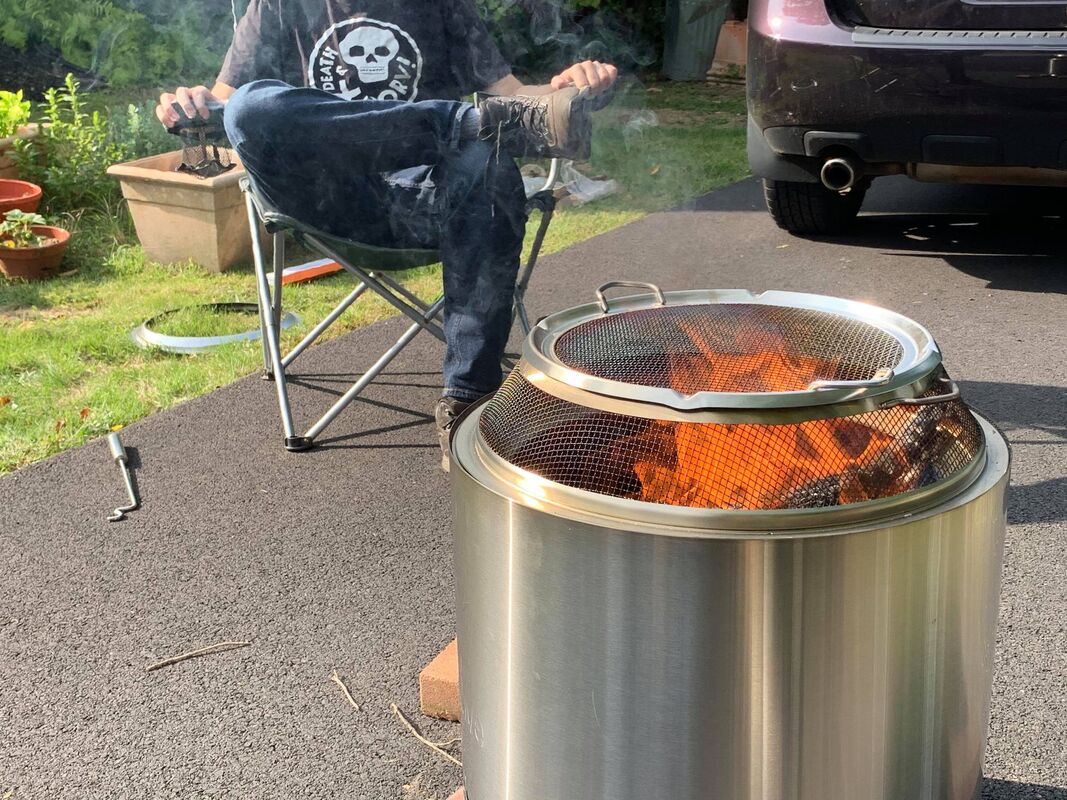
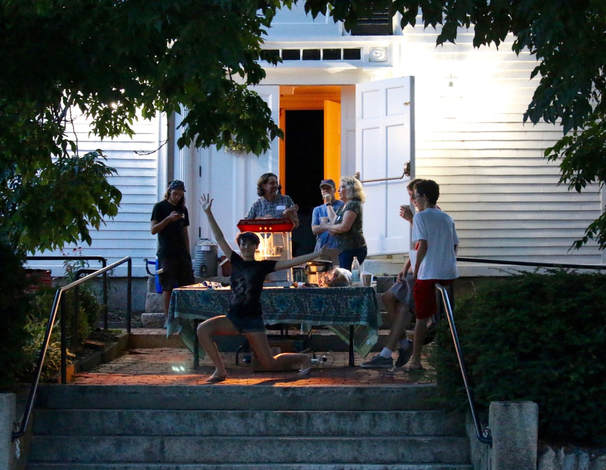
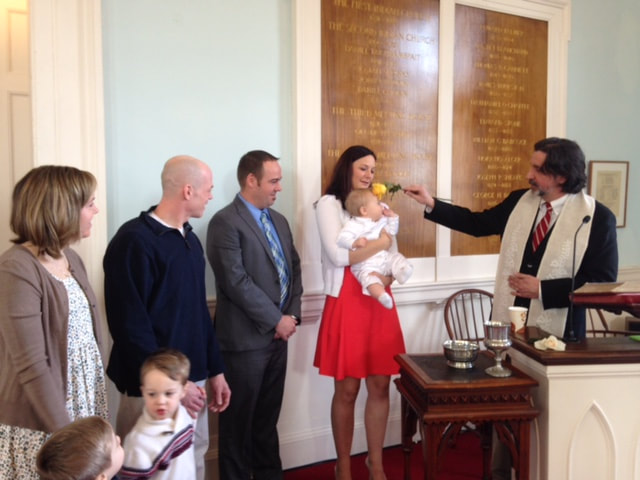
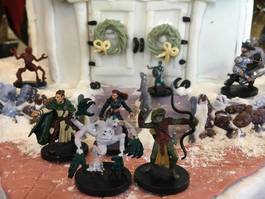
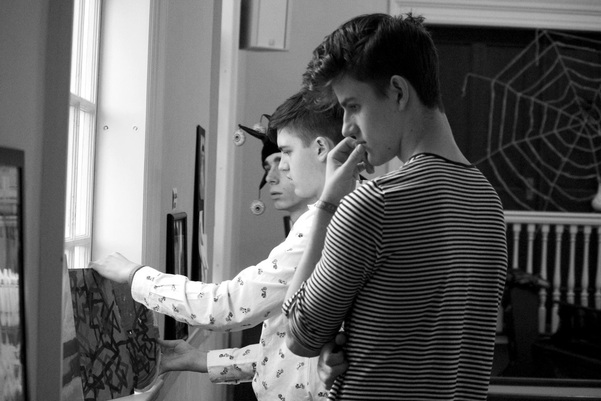
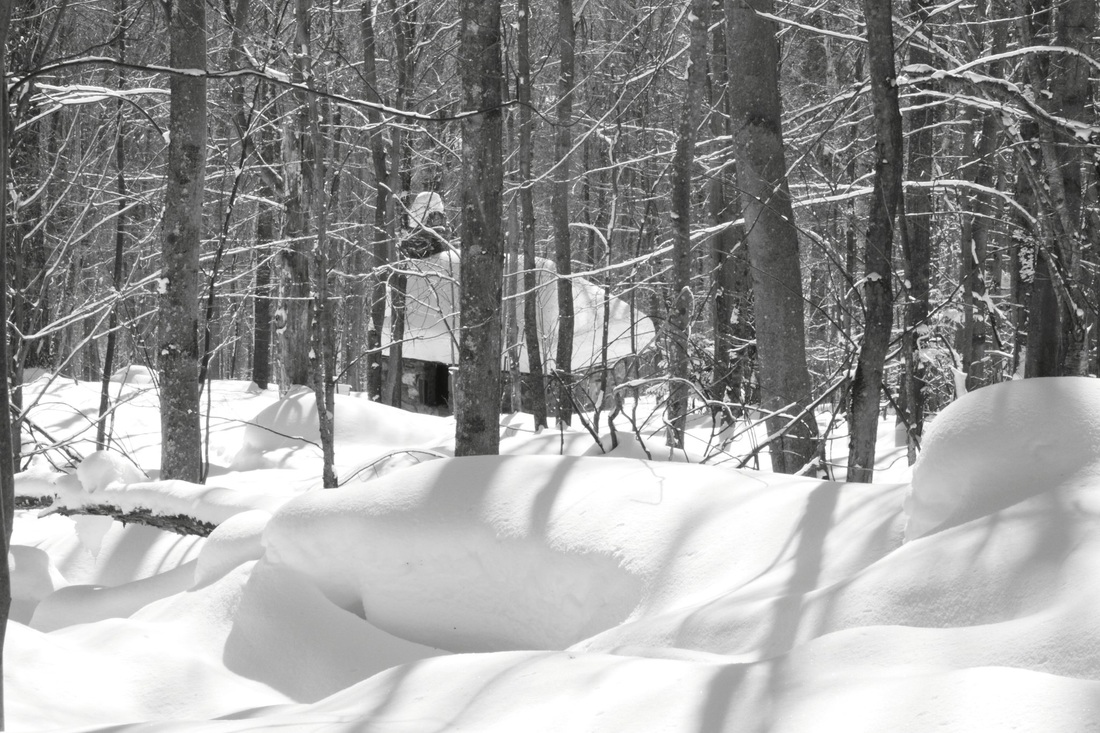
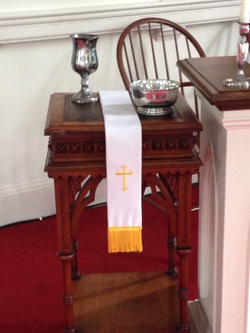
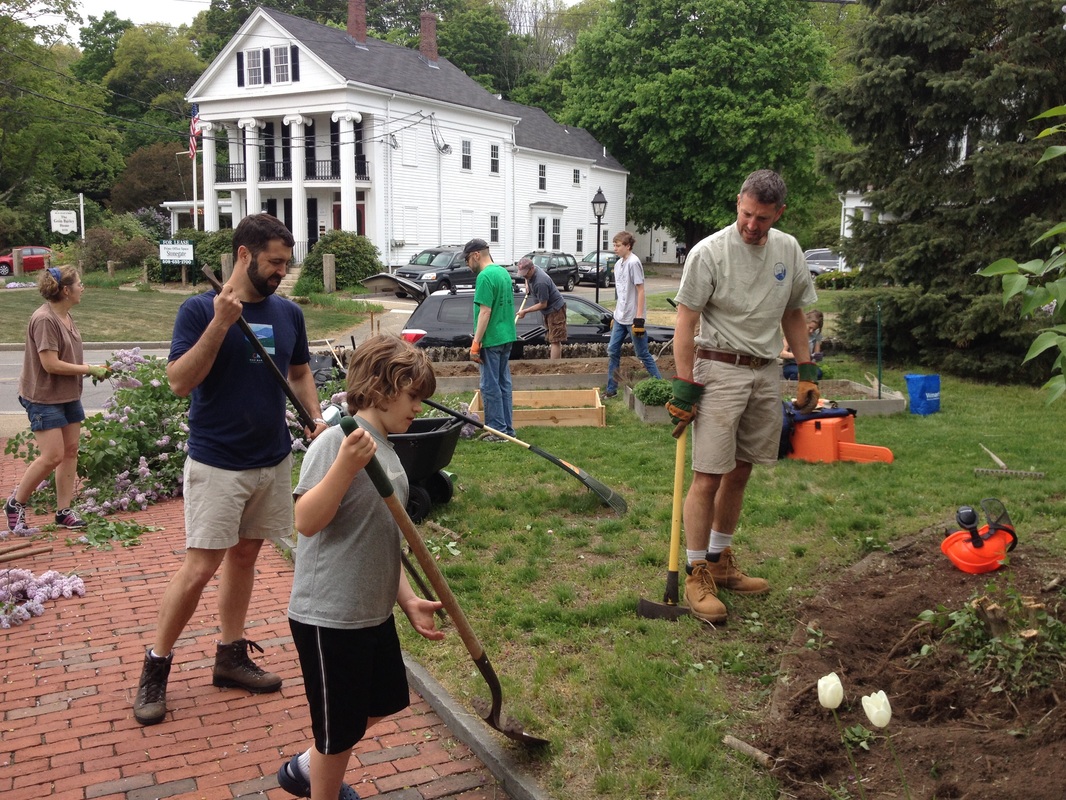
 RSS Feed
RSS Feed